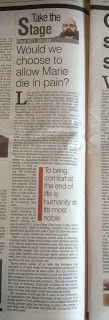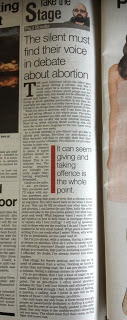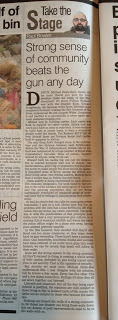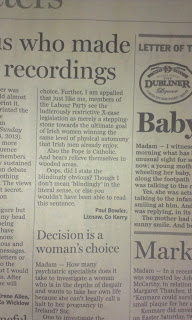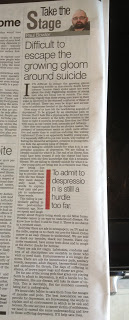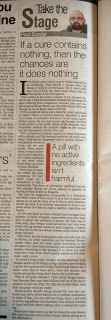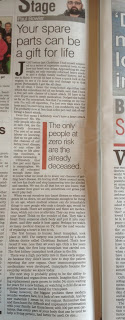Last week I wrote an article about Organ Donor Awareness week. A friend from the twitterverse then contacted me to share his story.
This is the story of my sister’s organ donation. I have changed some facts so as to protect the identities of those that I love. But it’s the story from my perspective, the only one I can tell. I will refer to my sister as Anne.
Just over three years ago, one Tuesday evening my sister called me to tell me that Anne who lived in America had suffered an aneurysm and was in hospital with probable brain surgery to happen any second. None of us had any idea what this really meant but brain surgery is never going to be an appendix operation. Bear in mind, I may have some of the fine details relating to medical procedures wrong, but that’s ok, I don’t pretend to be a doctor.
We learned very quickly that effectively there was a weakness that had always been there in her brain that for some reason popped, increasing pressure in the areas around it. She had been brought to hospital and after an initial period of lucidity passed out. She never regained consciousness.
She had three operations but effectively too much damage had been done and parts of her brain had been deprived of oxygen for too long for it to hope to recover. This all happened over the space of about a week. Our family travelled within days to be with her and her family. Even before I left I knew that there was no hope of her ever coming back and that the best that we could hope for was for her to survive in a vegetative state on ventilators etc.
When I got there it was a terrible thing to see, this strong, independent woman a shell of herself. Half her head shaved and dented where they had operated and put part of her skull into her stomach cavity (to maintain blood supply should they be ever able to replace it). Unable to feed herself, surrounded by tubes and machines that go bing. Despite it all, there was laughter, knowing she wasn’t coming back there was still laughter through it all. Tears and unspeakable grief but still laughter.
When it became obvious that she could not live independently of the machinery, we all agreed that we could not possibly bring what was left of her home, to maintain her body when her personality, her “herness” was gone forever. She had said to her family that she would never want to live like that and we knew that we just had to let her go. At this point we brought up the possibility of organ donation and timelines to switching off her life support. The staff at the hospital were amazing. No avoiding any hard truths, but also full of compassion and respect. Wonderful people. From the surgeons to the orderlies, the front of house staff to the two ladies who looked after Anne 24/7, wonderful people all. Sometimes I think about these guys and the power of what they do. The strength of these people. The decency.
We met with the Organ Donor representatives who explained all the potential outcomes, what needed to happen and by when, to allow her organs to be useful to someone else. We also dealt with the hospital’s ethics committee who were wonderfully compassionate and helpful. There was paperwork and discussions and more paperwork and more ethics meetings but over a three day period the decision was made.
When the time came we all knew that when they took her off ventilation that there was a possibility that she could go into arrest immediately, within hours or it could be that weeks could pass. There was an outside possibility that her body could continue for years without support.
For her organs to be donated there was a window of one hour from the removal of ventilation to the point where the organs would have been so depleted of oxygen that they would have been rendered unusable.
We said our goodbyes and she was taken away.
We had been offered but declined two places downstairs where the organ donation team were ready, it was a small area and in my mind’s eye I could see a team of surgeons, doctors and couriers with iceboxes, ambulances outside with their engines on and across the city, potential donors and their families ready to go to surgery.
At this point, our sister was well gone. All that was her had fled. What we had was not really her and could never be again. What was her was broken. We were waiting for the inevitable. Part of me wishes that I had stayed with her until she died but there is a difference between talking about “harvesting” and witnessing it.
A representative from the Donor organisation stayed with us while her colleague had left to be on hand when Anne’s ventilator was removed and I guess we all relaxed as much as we could. However, 15 minutes after we were told that she had been taken off life support, the rep’s phone buzzed. She looked at us and told us that Anne had arrested. There was a second or so pause while it sunk in and then, release.
We knew then that she would be declared legally dead and her body operated on. I don’t dwell too much on what that must have meant. I know intellectually it’s just a corpse and of course she had already gone, her mind had already gone before her body did, but I can fully understand another view that could consider this process horrific. But, then I think of what I know now and it helps me with my grief and makes me smile and be continuously proud of my sister. Helping others even after her heart had stopped beating. Typical of her.
We stayed at the hospital, sitting in the room she had been in for nearly two weeks only with no bed, no tubes, no machines, for only another ten minutes or so. The arrangements had already been made with a local undertaker and to bring her body home even before she had died.
Both her kidneys and her liver were successfully transplanted the day Anne died. Saving three lives. Her eyes and bone marrow were also donated, but I am to this day still unsure of what happened, whether they were donated or simply used in experiments. But all to the greater good.
After the dust has settled and life does go on, as the cliche goes, I am proud of my sister, that her final act benefitted others.
So, organ donation? Tragedy happens all of the time. This was a natural one, a fault in her brain that would pop one day. I can understand that. I can put it somewhere. To lose someone to a drunk driver or an act of violence… I don’t know how anyone can cope with that. But cope they do. But, in my case, from where I sit, the tragedy that occurred to us, to lose someone so precious has turned into an occasion of happiness and pride. Knowing our loss became a gain, a rescue, a lifesaving event for at least three other families makes my heart burst with pride for my sister.
The grief, brought to the front of my mind through the action of writing this, will always be there. But it genuinely is tempered by the happiness and second chance it has brought others. I’d always carried a donor card, always believed that it was the right thing to do, to donate your organs should the unthinkable happen, but I had never expected to be involved on what I call “edge” stuff, to be right there in the middle of it.
The gift of life my sister gave does not necessarily impact the grief of some but it has worked for me. Through it all, there’s happiness that others benefitted. Maybe I bury my grief with this, maybe I mask it but I grieved terribly for her before her heart had even stopped. I know that this is not a reason to encourage donations in general as if doing “this” will assuage “that” and it’s not the reason our family chose to be involved in the donation. But it is true anyway.
I don’t believe that organs should be state property, or even that an opt out system should apply, the decision that was made in our case was and is empowering. All I would ask is that people think about it. Whatever is right for you, is right for you, but at least think about it and be comfortable with it. I don’t think less of those that don’t carry the card, download the app or tick the box on their drivers license, as long as that’s a decision that they’ve made, rather than a default setting.
Maybe one day I will meet those that have my sister’s eyes, kidneys and liver inside them. Maybe someone else looking through her eyes at me would freak me out, perhaps kidneys and liver only then. And, they’re not my sister’s anymore anyway. They are a vital part of someone else who has been given a second chance at life.
I am not superstitious or religious, nor do I believe in divine intervention one way or the other, but there’s a part of me that likes to think that before Anne was brought down to the operating theatre and we had told her to let go, that it was ok to, that she knew somewhere inside she had to let go to make a difference even though she no longer had the capacity to do so. I wish that were true and that I could know it. That she chose to let go for others.
But whatever her intention or otherwise, people live today that otherwise would not. I know very little about them, vague occupations, family statuses and locations but it is of no matter. They live.
I miss my sister terribly and always will, she was something else. You would have liked her.
